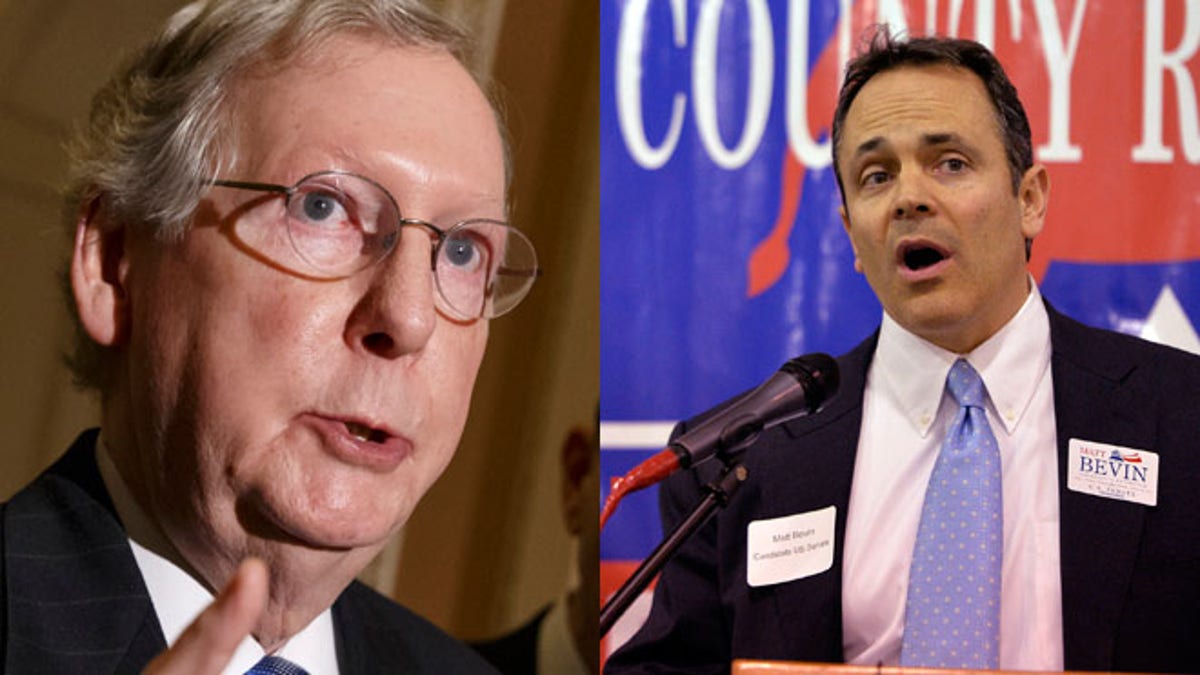
Shown here are Senate GOP Leader Mitch McConnell, left, and GOP primary challenger Matt Bevin. (AP)
Senate Republican Leader Mitch McConnell is facing the wrath of Tea Party conservatives – and particularly his top primary challenger – after he helped pull a controversial debt-ceiling bill over the finish line on Wednesday.
The Kentucky Republican did not vote for the bill in the final roll call. However, he did vote with several other senior Republicans to clear a filibuster hurdle after it became apparent the measure was in danger of failing. That move allowed the bill – which raises the debt ceiling with no strings attached -- to get a final vote.
Matt Bevin, the Republican businessman challenging McConnell in the primary this year, seized on McConnell’s role.
“Once again #McConnell caves to the left, and votes to break conservative filibuster on #DebtCeiling,” he tweeted, later blasting out to his followers a mock check made out to President Obama for “as much as you want.”
Republican leaders in both chambers, though, made clear over the last few days that they had little stomach for a drawn-out fight over the debt ceiling this time around. Though Republicans won a major victory in 2011 by extracting spending cuts from Democrats as part of that debt-ceiling deal, House Speaker John Boehner struggled in recent weeks to unite his caucus around a single strategy. With House Republicans divided, he put a “clean” bill on the floor on Tuesday and let it pass with mostly Democratic support.
McConnell and other senior Republicans tried on Wednesday to let Democrats do most the heavy lifting. But with Sen. Ted Cruz, R-Texas, demanding a 60-vote threshold for the bill to advance, McConnell finally voted yes on the procedural vote. It advanced, 67-31. The bill then passed on party lines, 55-43, with no Republican supporting it.
But for McConnell, the political damage was done. The Senate Conservatives Fund, which is backing Bevin, also accused the GOP leader of voting “with the Democrats.”
Bevin, for his part, is still trailing McConnell badly in the polls, and may see the debt-ceiling vote as an opening to make gains with primary voters.
One recent Kentucky poll showed McConnell potentially vulnerable in a general election. The Bluegrass Poll showed him trailing Democratic Secretary of State Alison Lundergan Grimes by 4 percentage points. But Bevin, while fairing nearly as well in a hypothetical match-up against Grimes, was still trailing McConnell by 26 points.
McConnell’s campaign is not showing signs of distress. A spokeswoman told The Hill last week the team is “very confident” about the state of the race and McConnell’s chances.
At this stage, Grimes is far more of a factor than Bevin.
The debt-ceiling measure itself would allow the Treasury Department to borrow for another 13 months and then reset the debt cap after that.
The Obama administration and its Democratic allies had warned Republicans that a failure to pass the increase would run the risk of the U.S. government defaulting on its debts. Republican leaders have been less inclined to wage high-wire fights of this nature with Democrats ever since they tried, unsuccessfully, to use a budget bill as leverage to undermine ObamaCare last year. The standoff resulted in a partial government shutdown, and Republicans in the end were not able to delay or repeal any major part of the law.




